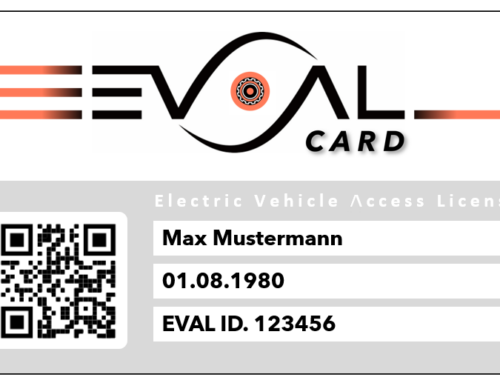Recurring training and further training for high-voltage training is of course required and even prescribed by law.
Since the introduction of our EVAL card in 2016, we have required our training participants to undergo regular further training. Otherwise the validity of their certificate will expire.
In recent months, we have been asked more and more frequently why our EVAL cards and EVAL certificates have a validity date, even though our competitors supposedly offer high-voltage training courses without a validity period.
It is difficult to influence what the competition is offering, but with this article we want to try to create some clarity for employers and also give the competition the opportunity to get a little more information.
We have a suspicion as to why some training centers do not indicate a validity period on their certificates, but we do not think that the fault lies exclusively with you.
If you look at the levels of legislation hierarchically from top to bottom, you will quickly see why recurring instruction is necessary.
If you only consider the lowest level as a legal requirement, you may not find a requirement for recurring instructions in some information.
However, this does not mean that the overriding legal regulation must not be complied with.
Let’s first look at the hierarchy of legislation (relating to safe working on vehicles with high-voltage systems).
- EU Framework Directives (European Framework Directive on Safety and Health at Work)
- LAWS (Employee Protection Act – ASchG)
- REGULATIONS (Electrical Safety Ordinance ESV)
- STANDARDS (EN 50110-1)
- INFORMATION (OVE Directive R19, R16, DGUV 209-093)
At the top of the list is the European Framework Directive on Safety and Health at Work.
The national implementation of this EU directive with regard to occupational safety is the Employee Protection Act.
This is followed by a number of implementing regulations. One of the most important in our case is the Electrical Safety Ordinance.
Under point 4 , we find the standards. In our example, the EN 50110-1.
Finally comes the information.
For example, the OVE Directive R19 for Austria and DGUV 209-093 for Germany.
Let’s first look at the legislation in which recurring instructions are requested, from top to bottom:
- Section 14 (3) of the Employee Protection Act stipulates that training must be provided at regular intervals. In any case, if the instruction is specified as a risk prevention measure or in an ordinance to this federal law.
- Section 13 (1) of the Electrical Safety Ordinance stipulates that employers must ensure that live work is carried out in accordance with the recognized rules of technology. (2) The work may only be carried out by qualified electricians or electrotechnically instructed persons who
- have received specialized training relevant to the work in question and the necessary follow-up training, and
- have the necessary equipment and personal protective equipment for the work in question.
- EN 50110-1 stipulates (under point 6.3.2) the maintenance of technical skills.
- The OVE guideline R16 requires the maintenance of technical skills through recurring training.
- DGUV 209-093 also stipulates regular participation in training courses.
Unfortunately, the OVE Guideline R19 does not prescribe recurring training, which could also be the reason why some training institutes do not offer periodic training.
However, the employer must inform himself about the state of the art (in accordance with the ASchG).
In this case, from today’s perspective, we recommend using DGUV 209-093 or OVE Guideline R16 as a source of information.






Leave A Comment
You must be logged in to post a comment.